Eseovwe Emakunu is a Nigerian theatre enthusiast, scholar, performer, and lecturer at Dennis Osadebay University in Asaba, Delta State. He sat down with Dan Kpodoh—who is a performer, playwright, director, choreographer, and lecturer at the University of Africa, Toru-Orua, Bayelsa State—for a conversation that centers the evolution, social impact, and thematic thrust of the Dan Kpodoh’s play The Struggle.
Interrogating the Politics of Oppression in The Struggle
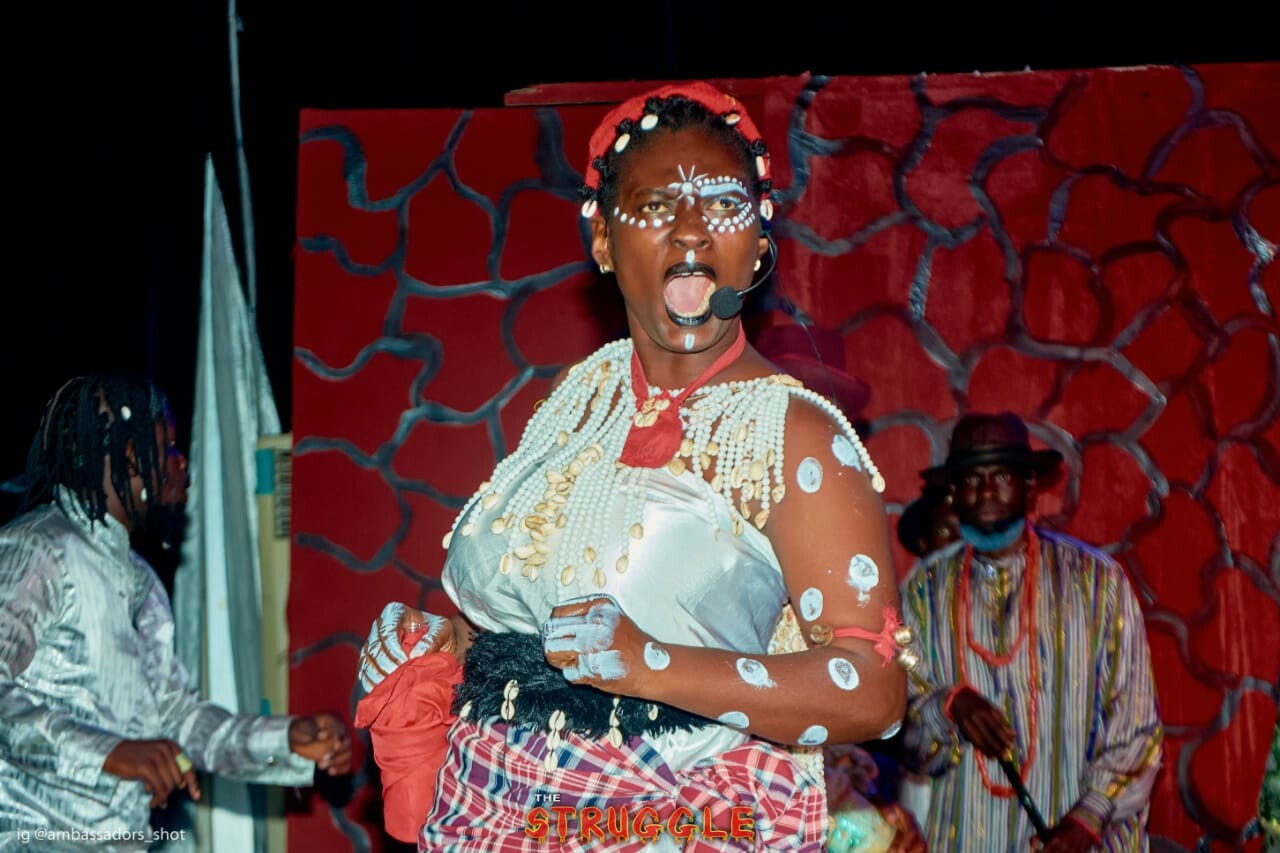
Awherotoma Favour Nabofa in The Struggle by Dan Kpodoh at the Arena Event Centre. Directed by Dan Kpodoh. Scenic design by Boms Kingsley Gift. Costume design by Helen Phenson Kpodoh. Lighting design by Patrick Agha. Photo by Akande Donatus.
Eseovwe Emakunu: Creating The Struggle must have been taxing. Can you walk me through the process that culminated in the finished product, the play?
Dan Kpodoh: I started creating The Struggle while at the University of Portharcourt. I was working on a topic for my final year-long essay on the Niger Delta militants and what fanned the embers of their agitation. In the course of my research, I met some leaders of the Niger Delta struggle. I met General Boyloaf, General Africa, Pastor Reuben Wilson, and Ateke Tom.
During my research, I realized that the boys started with an initially laudable venture, which was the liberation of the Niger Delta people from exploitation by both the government and the oil exploration companies, whose activities led to environmental degradation through oil spillage on their farmlands and waters, killing the fishes that were their main source of livelihood. But along the line, they became corrupted by money and derailed the struggle, unfortunately. After the research, I combined historical truth with drama, joining what happened during that period and turning it into a drama for the world to see.
Eseovwe: I figure that the research process for The Struggle was both difficult and frightening. Were you not afraid of being killed or kidnapped? Was there no fear in you as an artist going into such terrain like the creeks of the Niger Delta, where the militants reside and carry out their activities?
Dan: As an artist, we should always have a way of getting information, no matter how difficult the terrain. Afraid? Yes, but I told them, "It is your story that we want to talk about. If we're talking about your story, you should give me an audience so that we can put this out.” They were convinced and granted me an audience.
I combined historical truth with drama, joining what happened during that period and turning it into a drama for the world to see.
Eseovwe: The Struggle is a unique play that combines different African performative elements in one piece, creating a symphony of artistic tropes. What inspired you to journey into this creative plane?
Dan: In The Struggle, I drew from the Ijaw performance culture—who are primarily located in the Niger Delta region of Nigeria—especially the music, dance, costume language, and other performance elements. We have a vibrant culture, and it reflects who we are as a people.
From the opening scene of the play to the closing scene, song, music, and dance played an integral part. The play has seven original songs that were composed by me; and traditional Ijaw dance, Egepu Dance, accompanied by traditional drumming was also choreographed by me. The Egepu Dance was performed in the opening scene when they were celebrating the arrival of the money the government gave the community. The actors’ costumes were traditional Ijaw attire. We also had the Ijaw language as part of the dialogue in the play, especially in their salutations and interjections. The Ijaw language was also used as part of the dialogue in Movement Six by Mudskipper and Movement Seven by Anieffiong.
Eseovwe: You did not only write The Struggle, but you also created its performances on stage. How were you able to transform from a playwright into a creative director?
Dan: I'm a director and a choreographer, and I wanted to direct the play so that the message would not be lost. That is why I took it up to direct the performances. It was also wanted to explore my directorial and choreographic acumen. It was quite easy for me to direct and choreograph because the play and its messaging and the cultural expressions in the play are a part of me.
Eseovwe: Okay, so now let's talk about the sufferings of the Niger Delta people. Now, despite its abundance of oil wealth, that is being generated from the land and waters, can you enunciate this? Can you tell me more about the struggles, the suffering of the Niger Delta people?
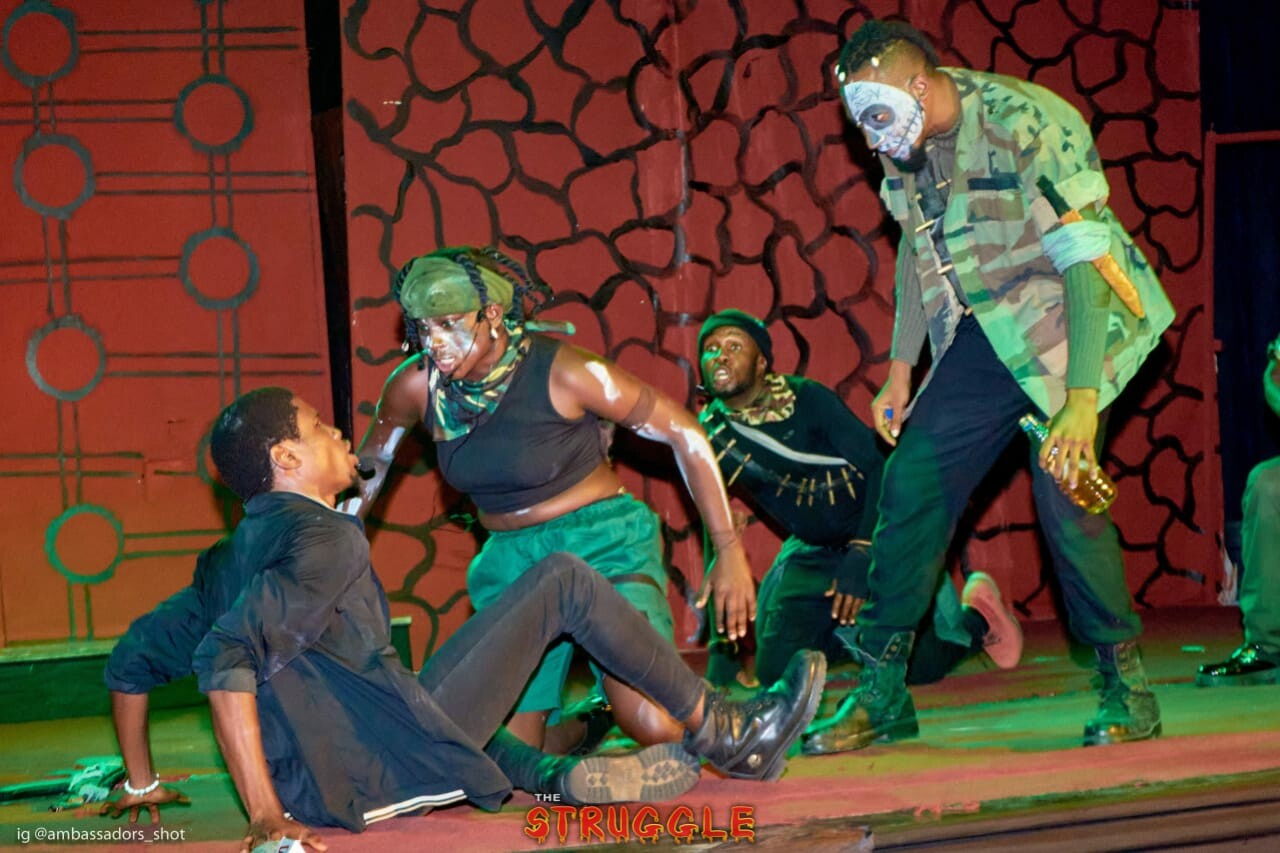
Doubra Agwana, Okezie Michael, Ebimene Ekubo and Spencer Charles Ezeadachie in The Struggle by Dan Kpodoh at the Arena Event Centre. Directed by Dan Kpodoh. Scenic design by Boms Kingsley Gift. Costume design by Helen Phenson Kpodoh. Lighting design by Patrick Agha. Photo by Akande Donatus.
Dan: It is the black gold that was given to us by God, and which is the liquid gold—oil—as a result of its discovery in Oloibiri. From that moment, the Niger Delta people have suffered segregation and neglect, which has resulted in the oil spillage in that area. Some thieves and some oil companies have taken advantage to enrich their pockets out of the suffering of the people. For a long time, the people have been complaining. It started from Isaac Adaka Boro, who started activism for minority ethnic rights and later declared the secession of the Niger Delta region of Nigeria on 23 February 1966; then down to Ken Saro-Wiwa, who led a non-violent campaign against the Nigerian government for the environmental degradation of the land and waters; and down to the Ijaw Youth Council (IYC), the socio-cultural youth group of the Ijaw people.
The likes of the Asari-Dokubo, General Boyloaf, General Africa, and Ateke Tom took the complaint to a whole new level during the tenure of Olusegun Obasanjo as president of Nigeria, involving militancy, kidnapping of expatriate workers of crude oil companies, and bombing of crude oil facilities to draw the government’s attention to the neglect the Niger People. Unfortunately, some corrupt and selfish people took advantage of it.
If you look at Dubai, for example, they have oil, and then they were able to use what they have to transform their cities. It is a thing of shame that in Nigeria, where so much is taken, the government who carries the load of the country cannot provide basic amenities in their communities. Water, good roads, electricity, hospitals—we do not have that. For that reason, the boys decided to use the power of the gun to attract attention for their voices to be heard. That's just the genesis of the crisis of the Niger Delta people with oil.
It was quite easy for me to direct and choreograph because the play and its messaging and the cultural expressions in the play are a part of me.
Eseovwe: Okay. Recently, we had a Niger Delta son as the president of the country, Nigeria. That's talking about Goodluck Ebele Jonathan. Do you want to comment about his administration and how it affects the Niger Delta issues?
Dan: He tried in his part, but a tree does not make a forest. He placed faith on some who betrayed him. They were supposed to empower the youths, do the roads, and then make some beautification around the Niger Delta region. But they didn't do that.
What happened to him was that he had trust and belief in the people that were around him. When I mean the people, Ijaws that were around him. When he came into power, into the seat, he was able to put mechanisms in place, and then his people became his immediate direct subject. Then, he gave them the power to go through putting things together, but they failed. That's what I'm saying. It was not his fault. It was a result of the betrayers around the office that he trusted.
Eseovwe: We can rightly say that the Niger Delta people sabotaged the struggles of the Niger Delta people.
Dan: Fine, we can say that because the chiefs did that. If a group of people are given money, they tend to turn against their entire community fighting for a just cause.
Eseovwe: In The Struggle, you pointed out the infighting that was prevalent among the Niger Delta people because of the oil wealth. Now, what do you think instigated these infightings?
Dan: Unfortunately, selfishness and greed are at the root of the problems faced in the Niger Delta region. The officials in charge of managing the funds coming from the oil wealth, including state governors, government officials, community heads, and leaders of thought, are more interested in sharing the wealth of the people rather than developing the region. This has resulted in division and infighting among the people. Even the militant leaders, who claim to be fighting for freedom, have become focused on money and government contracts. This led to sabotage of the movement.
In the opening scene of The Struggle, the Amanayabo of Opuloama community announces that the state government has given the community some funds for the development of the community; however, because he wants to steal the money for himself and some chiefs of the community, he unilaterally decides what the money will be used for, appointing his cronies Chief Asoyen and Chief Sokari. It is the embezzlement of these funds by the king and some of his chiefs that set out the conflict in the play.
There were other chiefs that were against what the Amanayabo did, like Chief Lokpobiri, and he was banished from the community by the king. The act of the greedy and corrupt Amanayabo and his chiefs quickly brought pandemonium to the community, which resulted to a revolt by the militants, who are also greedy and after the money that the government has given to the community. They want their own share of the money instead of focusing on the struggle for the liberation of their people. The timely intervention of Lokpobiri, who had returned from exile, stopped the fighting; and with a moving speech, he was able to get both the corrupt king and chiefs and the militants to see the bigger picture and focus on the development of their people and the fight for resource control of their oil wealth.
Eseovwe: That these internal conflicts hindered the Niger Delta's efforts to control their oil wells.
Dan: Some people genuinely care about the welfare of others and can voice their concerns effectively. Elder Clark is a great example of such a person who, like Lokpobiri in the play, has been a leading advocate for the Niger Delta people, particularly in the fight for true fiscal federalism in Nigeria. This means that each state in Nigeria would have full control over its natural resources and only pay a small percentage to the central government. This is especially important for the Niger Delta states, as it would enable them to take charge of their development.
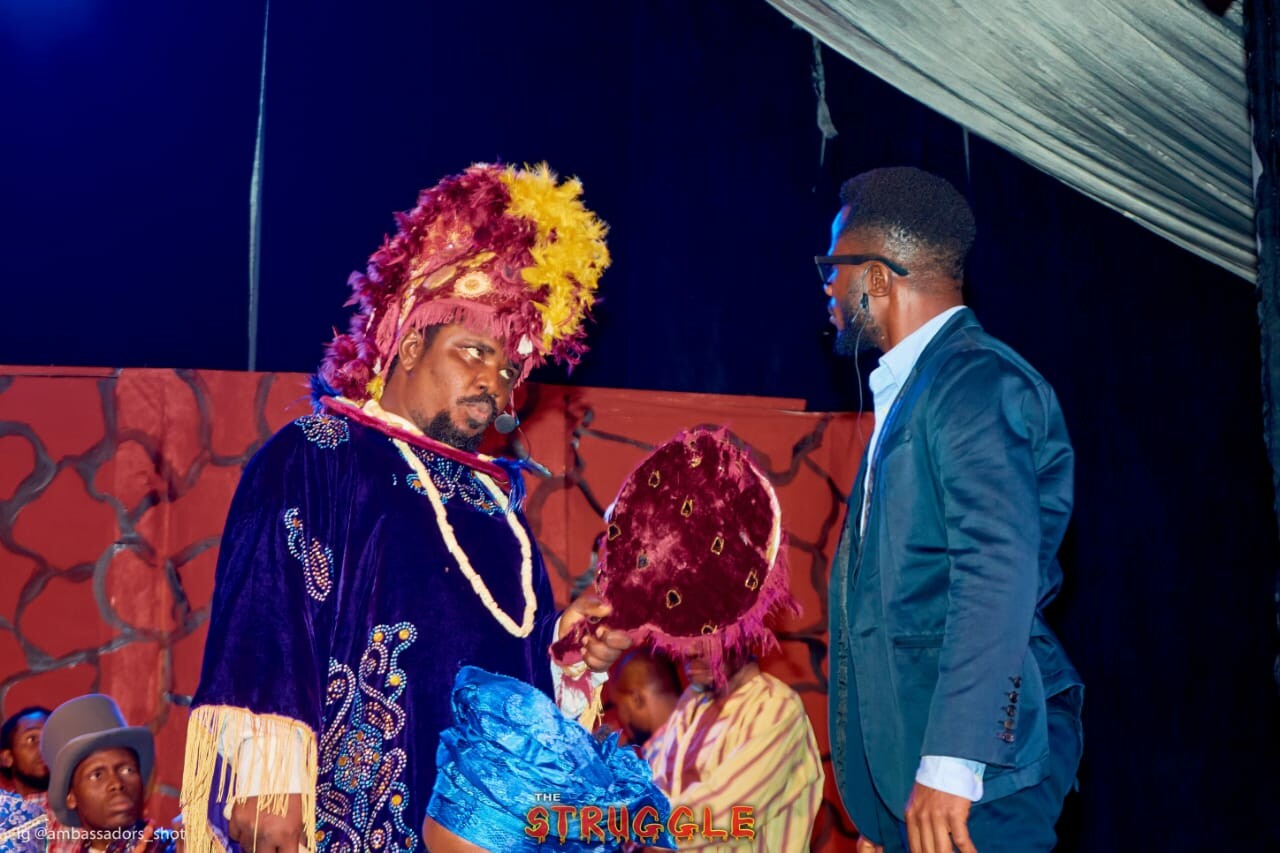
Chima Ekeh and Alfred Far Otite in The Struggle by Dan Kpodoh at the Arena Event Centre. Directed by Dan Kpodoh. Scenic design by Boms Kingsley Gift. Costume design by Helen Phenson Kpodoh. Lighting design by Patrick Agha. Photo by Akande Donatus.
Eseovwe: I would like to draw a parallel comparison between Zamfara state and the Niger Delta region. Zamfara state is known to have a significant amount of gold reserves, and it was reported that the state government has control over most of it. I am curious to know your thoughts on how this compares to the situation of the Niger Delta people.
Dan: It is important that the Niger Delta states also have access to their natural resources. However, a clear bias and oppression are happening here. Those in the south are seen as a conquered territory, which is why the profits from their natural resources are taken to Abuja, leaving them to beg for their share. Meanwhile, in Zamfara state, a northern state, they can control the gold exploration there. This is the very oppression that The Struggle is fighting against.
Eseovwe: During the Fourth Republic, which began in 1999-2000, James Ibori and others began advocating for resource control. During this time, President Olusegun Obasanjo's government established a 12 percent derivative fund, which was later increased to 13 percent. Additionally—
Dan: It was 13 percent.
Eseovwe: Later on, he established the Niger Delta Development Commission (NDDC) and the Niger Delta Ministry during the administration of Umaru Musa Yar’Adua. However, do you believe that these efforts are sufficient to quell the ongoing struggle for resource control among the Niger Delta people? It is worth noting that the struggle is still ongoing.
To succeed, we need to rid ourselves of internal oppressors and saboteurs who prevent us from achieving our collective goal.
Dan: The struggle in the Niger Delta region will continue until the people in the area have control over their resources. Only then can a portion of it be shared with the central government. It is important to acknowledge the contributions of figures like Ibori and the late Diepreye Alamieyeseigha in the fight for this cause. Due to their efforts towards the Niger Delta struggle, which ultimately led to their arrest and imprisonment. They were deceived and trapped before being captured. Both were released from prison, but unfortunately, one of them has since passed away.
Eseovwe: Can I disagree a little bit?
Dan: Go ahead, sir.
Eseovwe: While I appreciate your perspective, I respectfully disagree with your statement about the imprisonment of the former governors. In my view, they were rightfully sentenced for their corrupt practices, and it is important not to conflate their criminal actions with the broader Niger Delta struggle. Although these individuals held positions of power and influence, it is important to remember that they were diverting public funds that were intended to benefit their respective states.
Dan: I agree with you. But like I said, a just cause started well, and along the line corruption affected the cause.
Eseovwe: In The Struggle, your play, you advocated for a united front in confronting the oppressors. How can we achieve this, given the different political and even ethnic leanings among the Niger Delta people?
Dan: Achieving our common goal is possible if we remove the different tribal sentiments that divide us. We can attain this goal if we have pan-Niger Deltan leaders who prioritize the pursuit of resource control over political or ethnic considerations. To succeed, we need to rid ourselves of internal oppressors and saboteurs who prevent us from achieving our collective goal. By coming together and working towards a common objective, we can free ourselves from our oppressors and pave the way for a better future.
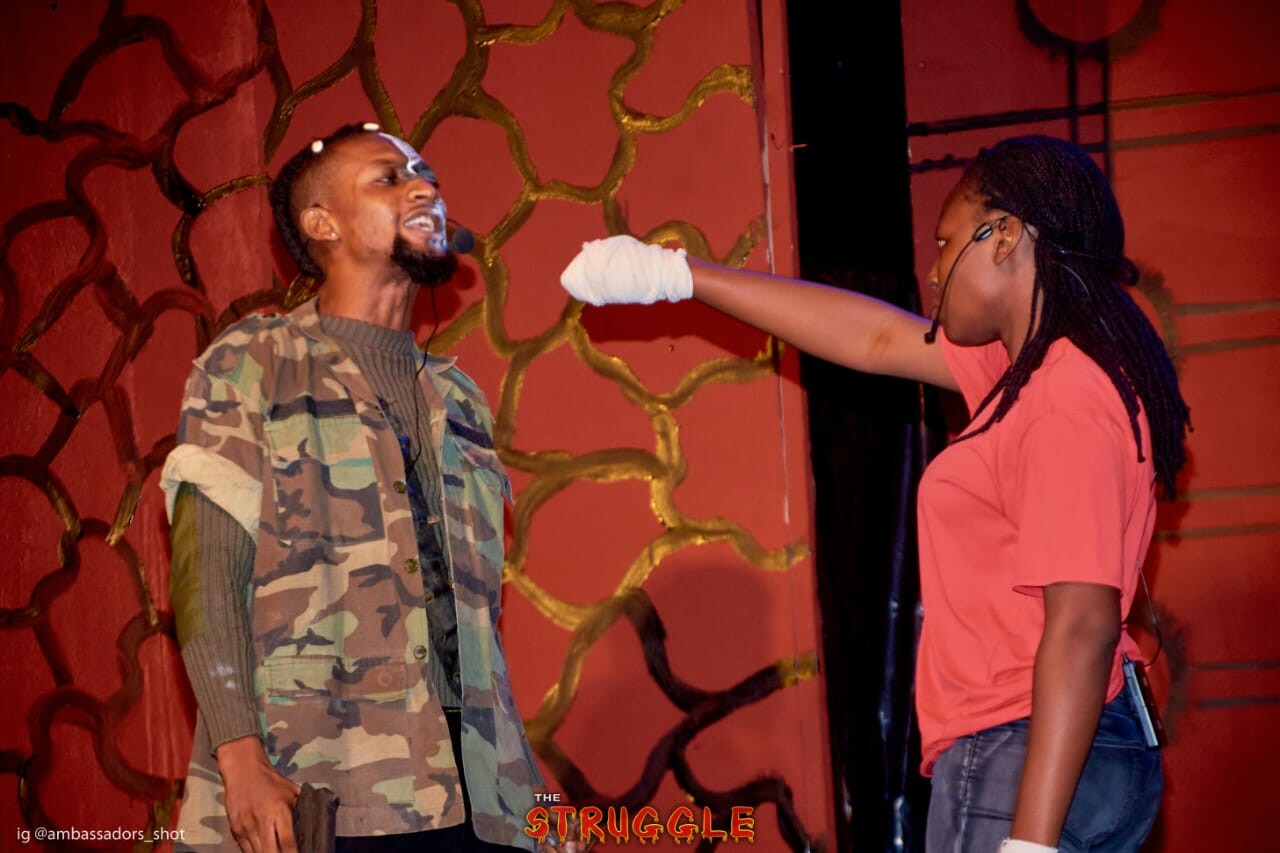
Chidinma Umeh and Spencer Charles Ezeadachie in The Struggle by Dan Kpodoh at the Arena Event Centre. Directed by Dan Kpodoh. Scenic design by Boms Kingsley Gift. Costume design by Helen Phenson Kpodoh. Lighting design by Patrick Agha. Photo by Akande Donatus.
Eseovwe: As we wrap up, what's your take on plays that talk about social and economic justice? How do they reverberate with our struggles for economic emancipation, and how would you say The Struggle falls into this category of plays?
Dan: The Struggle is a form of protest theatre that addresses the economic challenges faced by the people of the Niger Delta. It highlights the degradation and neglect of the region and serves as a voice for the poor who are unable to speak up for themselves. Many great playwrights like Femi Osofisan, Ola Rotimi, and Bode Sowande have explored these themes before me, and contemporary playwrights should learn from their work.
We must hold the government accountable and stand with the masses. I achieved this with The Struggle, and I am proud to have addressed the issues faced by the Niger Delta people. More plays should be written and performed to bring attention to the struggles of our people and to share our stories with the world.

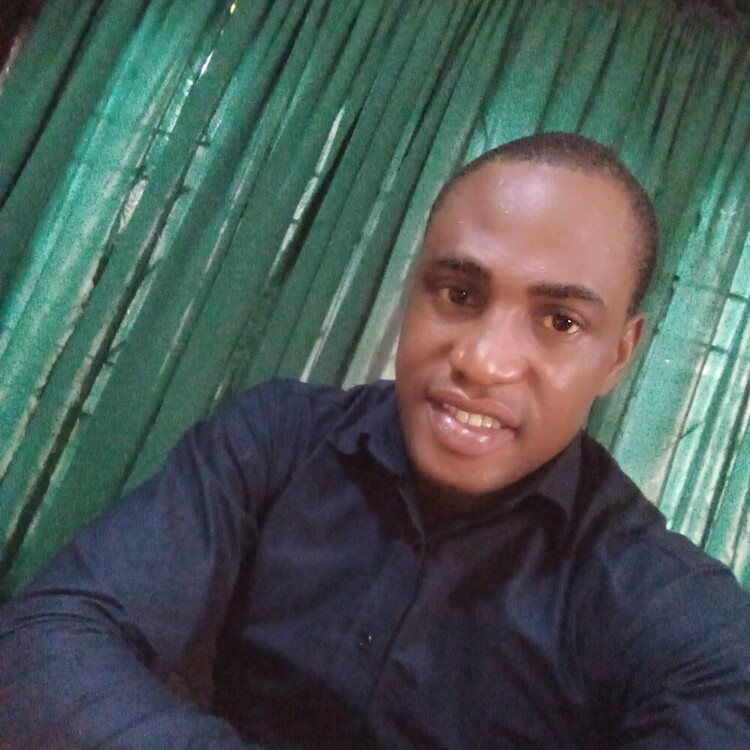
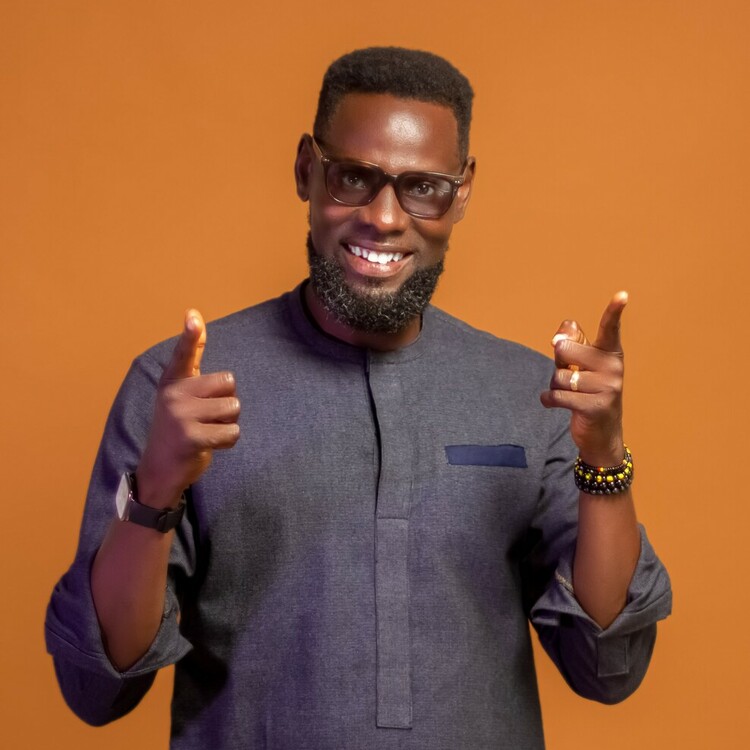
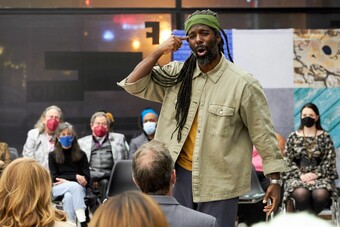




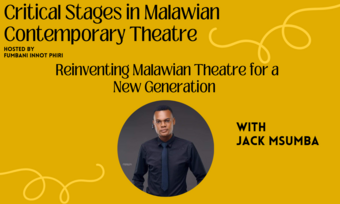


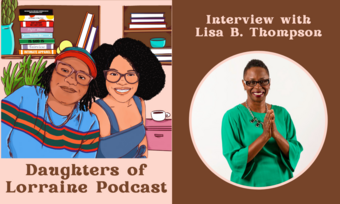


Comments
The article is just the start of the conversation—we want to know what you think about this subject, too! HowlRound is a space for knowledge-sharing, and we welcome spirited, thoughtful, and on-topic dialogue. Find our full comments policy here